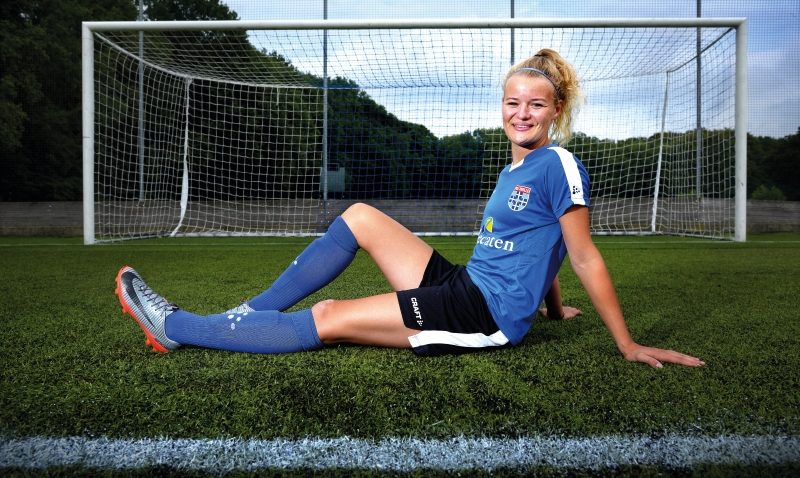Women’s football is unstoppable
Millions of viewers witnessed how the Orange lionesses became European champion. Student of the Teacher Education in Physical Education (CALO) Esmee de Graaf plays for PEC Zwolle and also notices that the numbers of spectators at her matches is growing.
It is Friday 1 September: the first match of PEC Zwolle’s women’s team after the summer break. Roughly one thousand spectators are sitting at the stand. That’s a few, if you compare it with the visitor numbers of the last European Championships. “But it’s almost twice the number as the average match in the last season.”, assured fourth years Esmee. She is playing her third season as attacker for the club of Zwolle. “Amazing to play for so many people. An enormous kick!”
More television attention.
The fact that women’s football is growing, is not only thanks to the success of the last European Championship, says Esmee. The growth has been happening longer than that. “As a seven-year-old, I started playing football in the brand new girls’ team of the IJsselmeervogels from Spakenburg. We were the only f-team, the first e-team, and so on. Now they already have more girls’ teams. Other clubs do so as well. The victory of the women’s team will cause more girls to want to sign up for football.”
Also on television and other media, women’s football is given more attention. “I expect this to grow more and more. Since the European Championships, the matches of the Dutch women’s team are broadcasted live. Furthermore, since this season NOS Sport broadcasts a summary of an Eredivisie match at least every Friday. It may be at 23:30, but it’s a good start. I think that more Eredivisie matches will be broadcast in the next season.
No theatrical play
Men tend to raise a giggle when talking about women’s football. Former goalkeeper Ronald Waterneus wrote in a column that he found that women’s football is being jammed down his throat during the European Championships, and that he finds the level of top sport teams not that good, ‘regardless of their cutely enthusiastic commitment’. Other analysts were also patronising. Esmee shrugs it off. “I do understand why they feel that way. They are used to agility and physical football. But you cannot compare women’s and men’s football with each other. Men’s football is faster and more physical. That’s a fact. If you can’t accept that, you really shouldn’t be watching. The difference is caused by the build of a man’s body and the level of training, possibilities and sponsoring. But there’s change for women concerning that. For example, I think that women will become quicker.” “Women’s football became professional in a later stage, but we are developing. Regarding technique, we are just as good.”
Esmee thinks women’s football is a lot cleaner. “There is less diving. And at an offense women do not portray a theatrical play, they just move on. Even when they have an injury or if they receive a yellow card. They generally don’t go against it, but accept it instead. At men’s football that’s a different story.”
Working besides sport
During discussions in the pub, female football players are sometimes being whipped. Esmee: “I almost never had to deal with that. In the past, if I was watching men’s football, every now and then I heard someone cry ‘Hey, this is not women’s football, is it?’ when the team wasn’t performing well. But I don’t worry about that. Everyone is doing their best at their own level. Now, people often ask where I play, and they are impressed when I tell then I play for PEC Zwolle.”
Although Dutch women’s football is growing rapidly, the differences between the clubs (regarding payment, for example) are still large. “There is a large difference in level in the Eredivisie of women’s football. At teams like Ajax, women tend to be paid well and don’t really have to apply for a job besides professional football. They can therefore fully concentrate on their training. At PEC Zwolle, we get a compensation. This makes me happy, but most players still study and work besides playing football. Fortunately I’m of the generation who receives a student loan, and who has parents who give a contribution. That’s how I can concentrate, apart from the training sessions, which are five times a week 1,5 hours plus a match, fully on my studies.’’
Mental coach
Nevertheless, Esmee thinks that the football club in Zwolle becomes more and more professional. “A lot has changed since my first season at PEC. Besides a trainer, trainer’s assistant, physical therapist and doctor, we now also have a strength trainer, a mental coach and a dietician. The staff has expanded. Besides, we practice five times a week instead of three times. And food is always prepared by volunteers. Delicious, cosy, and you don’t have to go to the supermarket and start cooking after an intensive day of studying, working and training.
Tessa Klooster
Photo: Jasper van Overbeek
